During October Hillingdon Libraries staff were set the challenge to read a book that hadn’t originally been written in English but translated. How does reading a translated novel change the tone, the theme and even the story itself? Or..if there any real difference at all?
We would have loved to get a group together of multi-lingual librarians but unfortunately we only had a couple of English speakers, so we went with them and here is what they had to say.
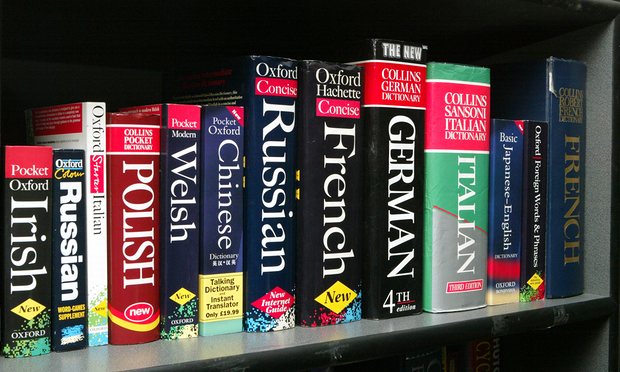
1. War and Peace by Leo Tolstoy
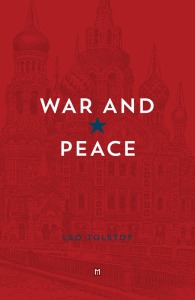 The heft of this novel is, of course, terrifying, but a good translation makes this novel approachable and relatable. I chose the Penguin translation by Anthony Briggs. I did so because the first sentence of the novel is spoken in French by the character, and Briggs takes the decision to render this in English and tell us it was spoken originally in French – other translations put it in French and provide a footnote (as with all the other French in the novel), which makes a book of such forbidding length even more daunting. He also finds English idioms to get the sense of a Russian phrase across, rather than just translating a Russian idiom that mightn’t make much sense to us. As I don’t speak or read Russian (or French), I welcome these considerations.
The heft of this novel is, of course, terrifying, but a good translation makes this novel approachable and relatable. I chose the Penguin translation by Anthony Briggs. I did so because the first sentence of the novel is spoken in French by the character, and Briggs takes the decision to render this in English and tell us it was spoken originally in French – other translations put it in French and provide a footnote (as with all the other French in the novel), which makes a book of such forbidding length even more daunting. He also finds English idioms to get the sense of a Russian phrase across, rather than just translating a Russian idiom that mightn’t make much sense to us. As I don’t speak or read Russian (or French), I welcome these considerations.
So yes, War and Peace – one of the great Russian novels, one the great novels full stop, with a massive cast of characters to variously despise, fall in love with, sympathise with and cheer on. The depictions of military strategy and the Napoleonic wars are very detailed and, whilst they drag a bit, do stand as an important historical document. For me, far more interesting are the affairs of the heart which are just as realistic whilst also being emotionally satisfying. The BBC did a great job of slimlining the various plots earlier this year, but it’s well worth reading this to get the full flavour.
5 out of 5 stars.
Darren – Uxbridge Library
2. The Trial by Franz Kafka
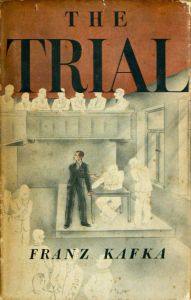 Not being familiar with German, I’m unable to judge the quality of the English translation by Prof Richard Stokes of this famous novel by Kafka, but it reads fluently and cogently enough. Indeed, as Kafka left the book unfinished it may, to paraphrase James Thurber, lose something in the original. However, Prof. Stokes’s grasp of English is not always certain, with several sentences divided by a comma when a semi-colon or full stop was needed.
Not being familiar with German, I’m unable to judge the quality of the English translation by Prof Richard Stokes of this famous novel by Kafka, but it reads fluently and cogently enough. Indeed, as Kafka left the book unfinished it may, to paraphrase James Thurber, lose something in the original. However, Prof. Stokes’s grasp of English is not always certain, with several sentences divided by a comma when a semi-colon or full stop was needed.
The deliberately mystifying tale of a man caught up in a legal process without a charge or any apparent set rules has been vastly influential on 20th century literary views of the human condition, and is a compelling read, even if nobody is sure in what order some of the chapters should be. I was surprised by the snobbery and casual sexual encounters along the way, but if one can be said to enjoy such a forbidding tale – I certainly did.
4 out of 5 stars.
Mike – Eastcote Library
3. Journey to the Centre of the Earth by Jules Verne
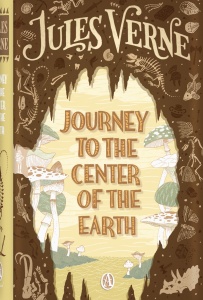 The edition I read was a new 1992 translation by William Butcher for Oxford Classics, complete with all the usual scholarly apparatus of introduction, notes, bibliography, & chronology of the author’s life & writing. In this sense, the updating of mid-C19 French to modern English could be very interesting for a bi-lingual, historically-minded reader, of course. But, alas, I do not have sufficient French of any kind beyond academic smatterings & literary quotations: plus ca change!
The edition I read was a new 1992 translation by William Butcher for Oxford Classics, complete with all the usual scholarly apparatus of introduction, notes, bibliography, & chronology of the author’s life & writing. In this sense, the updating of mid-C19 French to modern English could be very interesting for a bi-lingual, historically-minded reader, of course. But, alas, I do not have sufficient French of any kind beyond academic smatterings & literary quotations: plus ca change!
The translator-editor says he aims to be true to the original, naturally, & this includes the dropping of chapter titles/epigraphs which some previous editions had adopted, plus the retention of Verne’s mock-learned footnotes. Butcher is indeed quite thorough-going in his tasks with the notes & explanations of out-of-date terms & idioms, & is anxious to establish the context of Verne’s works as an author who has received quite-different receptions in Britain & Europe. That said, the tale is not swamped by academic pressures under translation but, for me, is elucidated if read closely & totally with the critical apparatuses.
It is often considered that Verne is a ‘science fiction’ writer ahead of his time, predicting or even ‘engineering’ future technologies. This is not the case in this mid-career text, however, as Verne is displayed as very much of his time, & as a ‘mere’ descriptive or discursive author taking part in the C19 controversies over (yawn?!?) geology, mineralogy, Creationism v evolution, palaeontology & archaeology, all within the general climate of the Religion v Science debate. Again, Verne’s continental kudos is/was based on these more-intellectual factors, whereas he is largely remembered or still celebrated now in Britain as a children’s writer of fantastical adventures, eg this text, Twenty Thousand Leagues Under the Sea (1870) & Around the World in Eighty Days (1873). This suggests that his texts have aged & ‘fossilised’ epistemologically, whilst managing to retain their narrative interest & ‘thrills’ despite their age; witness the film & cartoon versions of these three works in the last 50-60 years or so?
My own take on the ‘adventure’ is that it is an excuse & shaggy dog tale/cock & bull story-cum-ragbag in which to fill Verne’s (pseudo-?)scientific interests & hobby horses of the day; which is OK, if somewhat anti-climactic & continuously frustrating in terms of the tale & the fulfilment of a quest!
3 out of 5 stars.
Len – Harefield Library
4. The Book Thief by Markus Zusak
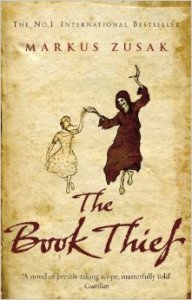 Markus Zusak set his novel during WW2, in Germany. It is the story of foster girl Liesel Meminger, who lives outside Munich. Liesel is a young girl who discovers books, after her brother died on their way to meet the foster parents. Liesel is addicted to books and reading and she shares this passion with her foster dad, who taught her how to read and write.
Markus Zusak set his novel during WW2, in Germany. It is the story of foster girl Liesel Meminger, who lives outside Munich. Liesel is a young girl who discovers books, after her brother died on their way to meet the foster parents. Liesel is addicted to books and reading and she shares this passion with her foster dad, who taught her how to read and write.
As she longes for more books, Liesel finds ways and opportunities to steal books, some of which were meant to be burned by the Nazi regime. Her story is gripping and heartwarming and I read the book in both, German and English. Although, I prefer the book in its original language, I enjoyed reading the translated version, especially as it kept some phrases in German, thus maintaining the sometimes humorous mood and interaction between the characters.
4 out of 5 stars.
Franka – Hayes End Library
5. Candide by Voltaire
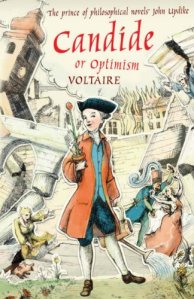 Love, love, love love! I really didn’t think I would. Brilliant satire on false optimism by Voltaire and originally written in French. The main character Candide believes that he exists “in the best of all possible worlds” despite going through more trials and tribulations than you would have thought possible. He is banished from his home and while travelling around the world is shipwrecked, loses his love, suffers an earthquake, becomes a slave, makes a fortune, loses his fortune and his companions suffer even worse disasters. All things that might make lesser men bitter & twisted, but not Candide who accompanied by his tutor Dr Pangloss believes that it’s all for the best and carries on cheerfully. A quick read at roughly 100 pages, this farcical adventure/satire/story is quick-paced and never gives you a moment to get bored. I read it in one sitting and enjoyed it immensely.
Love, love, love love! I really didn’t think I would. Brilliant satire on false optimism by Voltaire and originally written in French. The main character Candide believes that he exists “in the best of all possible worlds” despite going through more trials and tribulations than you would have thought possible. He is banished from his home and while travelling around the world is shipwrecked, loses his love, suffers an earthquake, becomes a slave, makes a fortune, loses his fortune and his companions suffer even worse disasters. All things that might make lesser men bitter & twisted, but not Candide who accompanied by his tutor Dr Pangloss believes that it’s all for the best and carries on cheerfully. A quick read at roughly 100 pages, this farcical adventure/satire/story is quick-paced and never gives you a moment to get bored. I read it in one sitting and enjoyed it immensely.
5 out of 5 stars.
Lara – Harefield Library
Has this blog made you more inclined to read a translated novel or less? What is your favourite translated novel? Please leave a message in the comments below.
Thanks for reading!


Some great choices here! I have wanted to read the book thief for years, but still haven’t gotten around to it *hides face*
LikeLike
You’ve been very good all the other months! 🙂
LikeLike